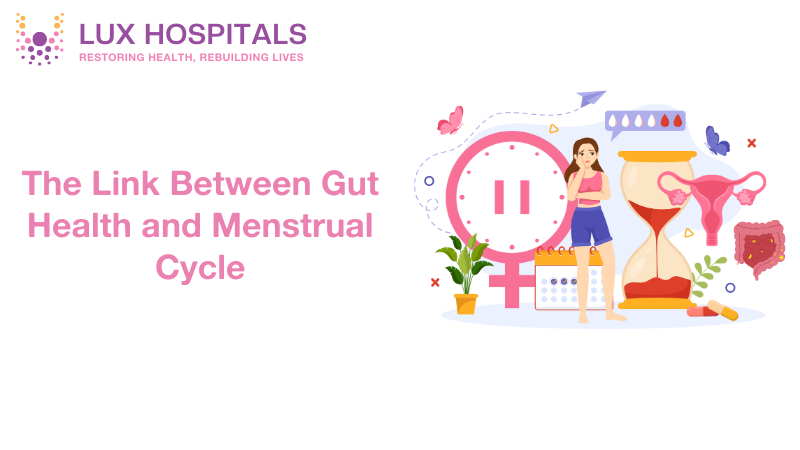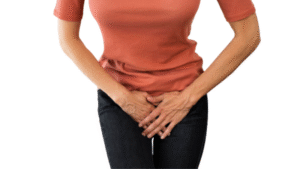Gut Health and Menstrual Cycle: How Your Digestive System Impacts Your Period

The relationship between the menstrual cycle and gut health is one that is gaining attention. Most women have digestive discomfort, bloating, or abnormal bowel movements at some point in their cycle, but few know how closely related gut health and period symptoms are. Knowing how they’re linked can maximize gut health and give a woman a healthier menstrual cycle.
The Connection Between Gut Health and Menstrual Cycle
Your gut controls hormones, which in turn directly affect your menstrual cycle. A well-functioning gut microbiome promotes effortless digestion, nutrient uptake, and hormone metabolism, which is required for a smooth cycle. If your gut health is poor, it may result in estrogen and progesterone imbalance, leading to PMS, bloating, mood swings, and other menstrual issues.
Hormonal Cycles and Digestion
Through the menstrual cycle, hormones progesterone and estrogen surge and fall. The changes in hormone levels impact digestion, movement in the gut, and equilibrium of gut flora. This is how:
- Follicular Phase (Days 1–14): Slowed accumulation of estrogen may promote better gut motility and strengthen digestion. During this phase, a person feels high energy with steady digestion.
- Ovulation (Approx. Day 14): More frequent bowel movements in some women can be caused by higher estrogen. Digestion is optimal now.
- Luteal Phase (Days 15–28): Progesterone increases, slowing down digestion and possibly causing bloating, constipation, and cramps.
- Menstruation (Days 1–5 of the Following Cycle): Prostaglandins, hormone-like chemicals, rise during these days to induce uterine contractions and affect gut motility, resulting in diarrhea or cramps.
Gut Health and Period Symptoms
An out-of-balance condition of the gut microbiome can amplify period symptoms. Inadequate gut health can cause:
- Additional PMS Symptoms: Gut bacteria regulate estrogen levels. When an imbalance occurs, estrogen dominance follows, and that creates extreme PMS symptoms such as mood swings, headaches, and bloating.
- Digestive Symptoms: Most women have constipation, diarrhea, or bloating because of hormonal changes in gut motility.
- Inflammation and Cramping: An imbalanced gut microbiome will elevate systemic inflammation, which makes menstrual cramps more painful.
How to Enhance Gut Health for an Improved Menstrual Cycle
Good digestive health can help with periods and general well-being because the menstrual cycle and the stomach are intimately associated. Take these simple actions to improve gut health:
1. Incorporate Foods to Promote Gut Health
A similar gut flora is ensured by a diet high in nutrients and fiber. Eat the following:
Fermented Foods: Kefir, sauerkraut, kimchi, and yogurt all contain healthy probiotics.
- Prebiotic Foods: Garlic, onions, bananas, and asparagus promote healthy gut bacteria.
- High-Fiber Foods: Leafy greens, lentils, beans, and whole grains optimize regular digestion.
- Healthy Fats: Omega-3 fatty acids rich in walnuts, flaxseeds, and salmon combat inflammation and aid in hormone health.
2. Hydrate
Digestion and detoxification are significantly aided by water. Maintaining regular bowel movements during your cycle might help prevent constipation and bloating.
3. Cut Inflammatory Foods
Processed foods, added sugars, and alcohol can interfere with gut health and trigger other PMS symptoms and pain. Cutting them back can bring on a healthier cycle.
4. Stress Management
Stress impacts the gut-brain axis, worsening gastrointestinal diseases and menstrual disorders. Yoga, meditation, and deep breathing not only enhance intestinal health but also reduce stress.
5. Probiotics and Supplements
Probiotics introduce beneficial bacteria that may help balance the gut microbiota, improving hormone metabolism and digestion. Supplements including omega-3 and magnesium can also reduce inflammation and PMS symptoms.
The Role of Gut Health in Menstrual Cycle and Digestion
Digestive health and the menstrual cycle go hand in hand. Hormonal changes influence gut function, and gut bacteria help in breaking down estrogen and progesterone. Because maintaining hormonal balance and minimizing discomfort, taking care of your digestive system may help you control your menstrual cycle.
Conclusion
The relationship between gut health and menstrual health is a component of overall wellness. Maintaining the health of your stomach through proper nutrition, hydration, stress reduction, and probiotic supplementation may help ease period and gut pain. Maintaining your digestive system might help your menstruation be more comfortable and improve your general health.
Frequently Asked Questions
Yes, gut health influences your period by regulating hormone metabolism, digestion, and inflammation. An out-of-balance gut can exacerbate PMS, bloating, cramps, and mood swings.
Yes, having a healthy gut microbiome can regulate hormone levels, dampen inflammation, and alleviate frequent PMS symptoms like bloating, mood swings, and headaches.
To avoid bloating, aim for a high-fibre diet, drink a lot of water, cut back on processed foods and added sugars, and add probiotics to help maintain gut health.
Gut health helps in the metabolism of hormones, especially estrogen balance. A disturbance in the balance of the gut microbiome will lead to estrogen dominance and trigger serious PMS symptoms, bloating, and mood swings.
Yes, female hormones are influenced by gut health since they help regulate estrogen metabolism and hormone balance. An irritated gut can lead to hormone imbalances, exacerbating PMS and menstrual symptoms.





















